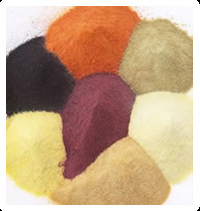Safflower Purchase & Information

Alternative Names
Alazor, American Saffron, Bastard Saffron, Benibana, Cártamo, Carthame, Carthame des Teinturiers, Chardon Panaché, Dyer's Saffron, Fake Saffron, False Saffron, Hing Hua, Honghua, Huile de Carthame, Kusumbha, Kusum Phool, Safflower Nut Oil, Safflower Oil, Safran Bâtard, Safranon, Zaffer, Zafran
Scientific Name
Carthamus Tinctorius
Why Do People Use Safflower?
The oral preparations of Carthamus tinctorius (Safflower), like safflower powder, are used for preventing atherosclerosis and reducing the risk of cardiovascular disease, to promote hair growth and for hyperemia in women. It is also used orally for fever, coughs, tumors, blood stasis, bronchial conditions, blood invigoration, pain, painful menses, amenorrhea, coronary heart disease, stimulating menstruation, traumatic injuries, chest pain, as a laxative, inducing sweating, stimulant, expectorant, purgative, abortifacient and antiperspirant.
In Foods Items - In various food items, seed oil of safflower is utilized as cooking oil.
In Manufacturing Preparations - Safflower flower is considered as essential component in dye fabrics and color cosmetics. Seed oil of safflower is also used as a paint solvent.
Is It Safe To Use?
Likely Safe - Oral and appropriate consumption of flower part of safflower is also considered safe to use.
Likely Unsafe In Pregnancy - There are a number of adverse effects reported by using safflower, which include menstrual stimulant, abortifacient and uterine stimulant effects.
Avoid During Breast Feeding - About the safety of safflower for breastfeeding females, there is insufficient information available.
How Effective Is Safflower?
Safflower powder is possibly effective for:
Hypercholesterolemia - Oral consumption of safflower oil as a dietary supplement may decrease total and low-density lipoprotein (LDL) cholesterol. On other hand, it does not appear to enhance high-density lipoprotein (HDL) cholesterol or decrease triglycerides.
However, for other to rate the effectiveness of safflower there is insufficient and unreliable information available.
How Safflower Works?
The most effective parts of Carthamus tinctorius are the seed oil and flower. Safflower flower consists of complex blend of yellow and red colors. The safflower yellow has anticoagulant and immunosuppressive effects. Safflower polysaccharide also contains immune-potentiating reactions. Extract of safflower shows vasodilating, uterine stimulant, cardiac stimulant, hypotensive and hypolipemic properties. Safflower seed oil is one of a rich source of effective unsaturated fatty acid called linoleic acid. It also consists linolenic acid. There are some confirmations, which recommend that essential fatty acid are important to keep up the uprightness of the central nervous system. Some other confirmation propose that diet comparatively higher in polyunsaturated fatty and unsaturated acids lessen atherosclerosis and the risks of coronary illness. A diet rich in safflower oil can increase the level of platelet linoleic acid and decrease the level of serum cholesterol, especially apolipoprotein B levels (6) and low-density lipoprotein (LDL) cholesterol without influencing high-density (HDL) lipoprotein cholesterol, serum triglyceride or the level of apolipoprotein A-1.
What Are The Side Effects /Adverse Reactions of Safflower?
Generally oral consumption of safflower powder has no lethal side effects, but in some cases allergic reactions in people sensitive to the Compositae or Asteraceae family of plants. Individuals from this family include chrysanthemums, ragweed, daisies, marigolds and many other herbs.
How Safflower Interacts With Other Herbs and Supplements?
Herbs and Supplements Containing Antiplatelet or Anticoagulant Properties
Oral consumption of mixture of safflower and herbs and supplements containing antiplatelet or anticoagulant properties may influence on platelet aggregation could enhance the potential risks of bleeding in some individuals. These herbs include clove, Panax ginseng, angelica, ginger, red clover, garlic, danshen, turmeric, ginkgo and others.
How Safflower Interacts With Drugs?
Antiplatelet or Anticoagulant Drugs - Interaction rating between Carthamus tinctorius and antiplatelet or anticoagulant drugs is moderate, so be careful about this mixture. Concomitant use with safflower may boost up the effects and adverse effects of anticoagulants.
How Safflower Interacts With Foods?
Not known.
How Safflower Interacts With Lab Tests?
Not known.
How Safflower Interacts With Diseases and Conditions?
Bleeding Disorders - Safflower powder consumption is contraindicated in those who are suffering from peptic ulcers, clotting disorders or hemorrhagic diseases. Safflower can also increase the time of coagulation.
Cross-Allergenicity - Safflower powder can be responsible for allergic reactions in persons sensitive to the Compositae or Asteraceae family. Members of this family are chrysanthemums, ragweed, daisies, marigolds, many other herbs.
Surgery - Safflower may have antiplatelet effects in some individuals. Safflower may leads to excessive bleeding if consumed perioperatively. So, such patient should discontinue safflower minimum two weeks before their suggested surgical activities.
What Should Be the Dose/Administration of Safflower?
ORAL
There is no typical dosage of safflower, however people use it as one cup of tea up to three times every day. To make such tea, simmer dried 1 gram flower in 150 mL boiling water for 5 to 10 minutes and then strain.
Comments
Safflower seed oil is essential source of linoleic acid.
General Certificate of Analysis (COA)
Specification sheet links below are a standard copy of the COA less the batch or lot number and manufactures dates. Specification sheet can be dated and should only be considered as a general information. Please contact and request an up to date COA if needed for specific updated information before placing order by filling out the contact form with product name and SKU number. If ordering quantities of twenty five kilos or more contact for availability.
